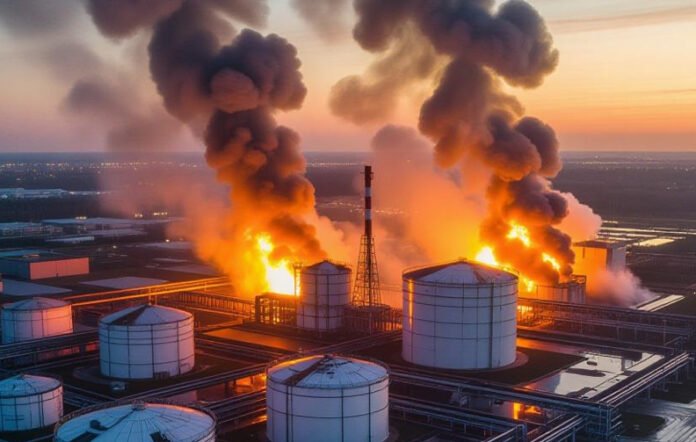By Global Energy Desk | Updated: October 21, 2025
In a startling escalation of industrial-targeted attacks, Russia’s Novokuibyshevsk oil refinery, one of the country’s largest processing plants, halted operations Monday following a drone strike that authorities described as “unprecedented in scale.”
The facility, located in the Volga region and operated by Rosneft, processes roughly 15 million tons of crude annually, accounting for a significant portion of domestic and international petroleum supply.
“Initial inspections show structural damage to several processing units and storage tanks,” said Alexei Makarov, a Rosneft spokesperson. “We are prioritizing safety and assessing the full impact on production.”
🚁 Details of the Drone Strike
According to local law enforcement and energy officials, multiple drones breached security perimeters late Sunday evening, detonating explosive payloads near key processing units. Security cameras captured flashes of fire followed by thick smoke, which could be seen from kilometers away.
Officials confirmed that no casualties among refinery staff occurred, as workers had been evacuated as a precautionary measure. However, the strike caused immediate suspension of crude processing, potentially affecting Russia’s refined oil output for weeks.
“This highlights a new level of vulnerability in industrial infrastructure,” said Dr. Tatiana Orlova, a senior analyst at the Moscow Energy Institute. “Attacks on oil refineries are rare but extremely disruptive — they can ripple through the global energy market.”
🌍 Impact on Global Oil Markets
News of the strike caused Brent crude prices to spike temporarily by 2.5%, reflecting investor concern over supply interruptions. Analysts warn that if the refinery remains offline for an extended period, Europe and Asia could face temporary crude shortages, pushing up fuel costs and potentially affecting petrochemical industries.
“Any disruption in Russia’s energy output has outsized effects,” noted James Kirkpatrick, energy market strategist at Global Insights. “Even a short-term shutdown can trigger price volatility in gasoline, diesel, and aviation fuel worldwide.”
Russia remains a critical supplier of both crude oil and refined products, with Europe relying on its exports for about 20% of total oil imports. Any significant downtime could also shift trade patterns, prompting buyers to source from the Middle East or the Americas.
⚠️ Geopolitical Implications
The drone attack comes amid heightened geopolitical tensions involving Russia’s international engagements. While no group has formally claimed responsibility, analysts speculate the strike could be part of broader hybrid warfare tactics targeting energy infrastructure.
“Attacking strategic energy sites is a way to exert economic and political pressure without direct military confrontation,” said Dr. Elena Novikova, geopolitical analyst at the Center for Strategic Studies.
The incident also adds urgency to Russia’s efforts to enhance industrial security for key oil and gas facilities. Authorities have reportedly deployed additional security units, anti-drone systems, and surveillance technologies to deter further attacks.
🔧 Rosneft Response and Recovery Plans
Rosneft announced a comprehensive damage assessment and immediate containment of potential fire hazards. Engineers are working to repair critical processing units, with temporary alternative arrangements being explored to redirect crude to other facilities.
“Restoring full production is our top priority,” confirmed Makarov. “We are confident the refinery will resume operations safely and efficiently in the coming weeks.”
The company emphasized that export commitments would be honored, and contingency measures are in place to minimize disruption to international clients.
📈 Looking Ahead
The Novokuibyshevsk attack underscores growing threats to critical energy infrastructure, particularly in volatile geopolitical climates. With global energy demand remaining high, any prolonged downtime could fuel further price fluctuations, impacting consumers and industries worldwide.
“Energy security is now inseparable from national security,” said Orlova. “Countries and companies alike must invest in resilient systems and emergency response frameworks to mitigate such risks.”
As global energy markets monitor the refinery’s recovery closely, this incident serves as a stark reminder: in today’s interconnected world, a single attack on key infrastructure can have far-reaching consequences.
















